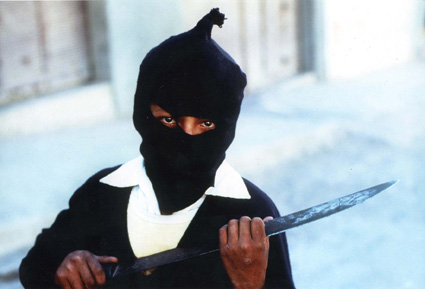|
Reviews of Recent Independent, Foreign, & Documentary Films in Theaters and DVD/Home Video
Directed by: Pamela Yates. Produced by: Paco de Onís. Director of Photography: Juan Durán. Edited by: Peter Kinoy. Music by: Tito la Rosa & Tavo Castillo. Released by: Skylight Pictures. Language: English & Spanish with English subtitles. Country of Origin: USA/Peru. 94 min. Not Rated.
There has often been a romantic perception of
Latin American guerrillas - the idea of common, everyday
people who are willing to die fighting corrupt governments, so abundant in the
region. It is David
against Goliath, good versus
evil. Obviously, most of those who think this way have
never been face to face with a guerrilla member or
have experienced what happens next. Only those who are far
away, emotionally as well as physically, can
romanticize such groups. The truth is
more brutal, bloody and complex than can be
imagined.
The Peruvian guerrilla cult, Shining
Path, inspired such feelings of sympathy throughout
the country at first, and, for a long time, the world.
They started small, almost unobtrusively, but by the
time they were finally beaten
70,000 Peruvians had died, and a president, Alberto Fujimori,
used the group as an excuse to obtain absolute control
and destroy most democratic institutions in the
country. Corruption, as well as military and police abuse,
became an organic way of life.
This development was slow, complex, and difficult to accept
by many Peruvians, who even today deny the
government's - and the country's - blame in the
resulting carnage. State
of Fear: The Truth about Terrorism explores this
process (from the origins of the Shining Path, its
methods, cruelty and fanaticism)
and also digs deeper to discover what
happened next. After Fujimori´s regime
fell, the Truth Commission
was established, the first
one in Latin America. Just like the Commission, this
documentary reveals as many points of view as possible, from former
terrorists, military members, torture victims, journalists, politicians, and human rights
activists.
It is painful for a Peruvian like myself to watch some of
the footage, but it is also eye-opening
regarding how today the world is facing another terrorist
group which is even crueler - if that is possible -
than the Shining Path, and that has generated various
reactions, some positive, some very negative and
violent. As this informative film illustrates, terrorism is not merely
what the terrorists actually do, but what they know
will happen next: repression, violence, and human rights
violations.
Personally, what struck
me more was how - looking back - tortures, executions,
and death squads were allowed to occur, and how people
didn't know. Truth had to be sought actively
and with perseverance, and many people could not or
didn't want to. This is one of the most important things to remember
about what happened, and State of Fear conveys this very
well: terrorism kills not just those shot,
burned, or "disappeared," but can also destroy the state. It creates
panic and panic makes people accept things they
wouldn't have if they had thought clearly.
There are a few omissions, events that should have been looked at
in more depth (such as the hostage situation in the
Japanese Embassy 10 years ago). But
all in all, it is an accurate portrait of a period in
Peru's history that, specially today, we never
should forget. Roxana M. Ramirez, lawyer and journalist, formerly a member of the Peruvian Human Rights and Public Service Ombudsman
|
